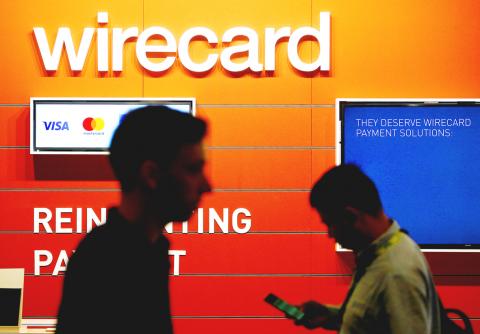Singaporean police are examining matters related to Wirecard AG, the German digital payments company whose shares have crashed amid allegations of executive forgery and fraud involving its Singapore office.
The police “are looking into the matter,” a spokeswoman for the force said yesterday in an brief e-mailed reply to questions from Bloomberg News.
Separately, the Singapore law firm Rajah & Tann LLP, one of Wirecard’s legal advisers, said it is unable to comment about the company because of “sensitivities.”

Photo: Reuters
Wirecard shares plunged more than 30 percent last week after the Financial Times reported that a senior company executive in Singapore was suspected of using forged contracts for several suspicious transactions.
On Friday, the FT cited a report from Rajah & Tann which it said had identified potential civil and criminal violations in Singapore, Hong Kong, India, Malaysia and Germany, findings that it said had formed the basis of a presentation to Wirecard’s senior management on May 8 last year.
Wirecard has repeatedly denied wrongdoing, calling the stories “inaccurate, misleading and defamatory.” Wirecard said no presentation was made to its senior management on the matter that day.
“Regrettably, we cannot respond to your queries at the moment due to sensitivities,” an external spokesperson for the Singaporean law firm said over the weekend, in response to queries from Bloomberg.
In Germany, financial regulator BaFin is looking at the issue for signs of possible market manipulation and Munich prosecutors are also reviewing the facts to decide whether to open a probe.
The digital payments company — which supplanted 149-year-old Commerzbank AG in Germany’s benchmark DAX index last year — operates in the tangled world of online payments. Founded in 1999, Wirecard initially provided financial services to online gambling and adult Web sites, barely surviving the dot-com bust. It is now threatening traditional financial services and until recently was worth more than Deutsche Bank AG, Germany’s largest lender.

Quanta Computer Inc (廣達) chairman Barry Lam (林百里) is expected to share his views about the artificial intelligence (AI) industry’s prospects during his speech at the company’s 37th anniversary ceremony, as AI servers have become a new growth engine for the equipment manufacturing service provider. Lam’s speech is much anticipated, as Quanta has risen as one of the world’s major AI server suppliers. The company reported a 30 percent year-on-year growth in consolidated revenue to NT$1.41 trillion (US$43.35 billion) last year, thanks to fast-growing demand for servers, especially those with AI capabilities. The company told investors in November last year that

Intel Corp has named Tasha Chuang (莊蓓瑜) to lead Intel Taiwan in a bid to reinforce relations between the company and its Taiwanese partners. The appointment of Chuang as general manager for Intel Taiwan takes effect on Thursday, the firm said in a statement yesterday. Chuang is to lead her team in Taiwan to pursue product development and sales growth in an effort to reinforce the company’s ties with its partners and clients, Intel said. Chuang was previously in charge of managing Intel’s ties with leading Taiwanese PC brand Asustek Computer Inc (華碩), which included helping Asustek strengthen its global businesses, the company

Taiwanese suppliers to Taiwan Semiconductor Manufacturing Co. (TSMC, 台積電) are expected to follow the contract chipmaker’s step to invest in the US, but their relocation may be seven to eight years away, Minister of Economic Affairs J.W. Kuo (郭智輝) said yesterday. When asked by opposition Chinese Nationalist Party (KMT) Legislator Niu Hsu-ting (牛煦庭) in the legislature about growing concerns that TSMC’s huge investments in the US will prompt its suppliers to follow suit, Kuo said based on the chipmaker’s current limited production volume, it is unlikely to lead its supply chain to go there for now. “Unless TSMC completes its planned six

Power supply and electronic components maker Delta Electronics Inc (台達電) yesterday said it plans to ship its new 1 megawatt charging systems for electric trucks and buses in the first half of next year at the earliest. The new charging piles, which deliver up to 1 megawatt of charging power, are designed for heavy-duty electric vehicles, and support a maximum current of 1,500 amperes and output of 1,250 volts, Delta said in a news release. “If everything goes smoothly, we could begin shipping those new charging systems as early as in the first half of next year,” a company official said. The new